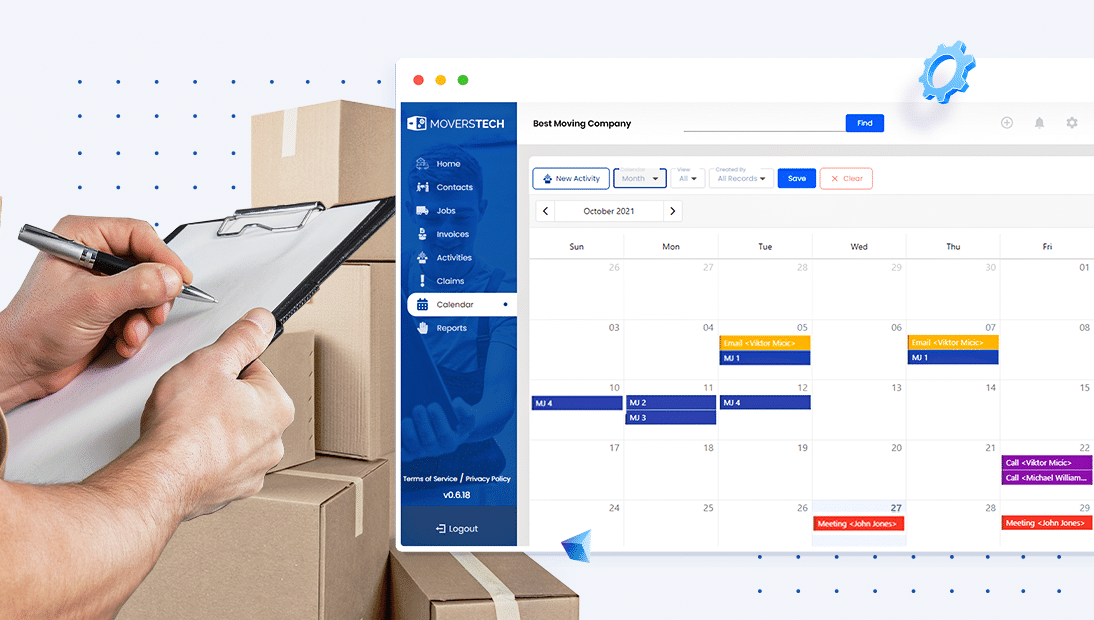The moving industry is no stranger to change. As technology grows, the way businesses operate changes quickly. A big part of this change is using digital ways to keep records. So, let’s look at the many benefits of digital Bill of Lading for moving businesses. It makes work efficient, keeps customers happy, and helps businesses do better.
Rise of technology in the moving industry and the role of digital Bill of Lading
As technology changes industries worldwide, the moving sector is also going through big changes. It’s interesting to see an area that once relied on hands-on work and physical paperwork now using modern digital tools.

A key sign of this change is the new digital Bill of Lading (BOL). It’s not just a digital version of the old paper form; it’s a safe, trackable document that shows how moving businesses are changing today. Using these new tools is about more than just working faster. It shows a commitment to being clear, quick, and flexible, meeting today’s needs and wants.
The benefits of digital Bill of Lading for moving businesses
Moving from paper to digital isn’t just a trend; it’s real progress in the moving industry. The digital Bill of Lading (BOL) shows this change, combining better efficiency, clarity, and flexibility. Let’s look more closely at this change and understand how the digital BOL benefits moving businesses.
#1 Why timeliness matters
In today’s digital age, fast actions and instant solutions are expected. Digital tools make things easier and faster for moving companies.
For instance, instant document signing benefits your moving company by cutting down on unnecessary delays. Not only does it expedite processes, but it also serves as an assurance to customers, reinforcing the company’s commitment to efficient service and security. This ability to swiftly act and adapt in the digital space augments operational efficiency and client trust, making it a cornerstone for modern moving businesses.
#2 Precision meets digital BOLs
The old saying, “accuracy is key,” rings true, especially in the moving industry where errors can cause significant setbacks. Traditional paperwork, while tried and tested, remains susceptible to human errors—be it misinterpretation of handwritten notes or misplacement of crucial documents.
The digital BOL is very different. It provides a clear platform where all the details are clearly and accurately recorded.
#3 The power of real-Time
In a world driven by instant gratifications, customers are no longer content with periodic updates—they seek real-time information. The promise of mobile access to your moving CRM is more than a digital upgrade; it’s a paradigm shift in customer engagement and service delivery.
This immediate accessibility ensures that clients remain in the loop, fostering a sense of involvement and trust. Furthermore, it empowers moving businesses to offer a superior service experience, marked by transparency and timely communication, which can be pivotal in fostering long-term customer relationships.
#4 The green initiative as a dual benefit
Although the main reason for going digital may be to work more efficiently, there’s also a strong focus on being environmentally responsible. With more worldwide talks about being green, it’s clear we need to lower our carbon impact.

But it’s not merely about why moving companies go paperless—it’s about the broader picture. Adopting digital documentation reduces waste, contributes to sustainability goals, and even presents cost-saving opportunities. By eliminating costs related to paper, printing, and storage, companies can allocate resources to other growth-oriented initiatives. Thus, the move to digital is an environmentally conscious decision and an economically sound strategy.
#5 Digital changes
Changes, which were once tedious and time-consuming in the traditional paperwork domain, now become instantaneous.
Digital BOLs can be updated, modified, or rectified in real-time, ensuring documentation accurately reflects the transaction. This flexibility is not just about correcting errors; it’s about being agile, responsive, and continually aligning with evolving client needs and business dynamics.
Movers transitioning to the digital era
Going digital means learning new tools and thinking about the future.For moving companies, this change is more than just a new way to work; it’s a big step to becoming industry leaders with a wider influence. Here’s a step-by-step guide to help moving companies change quickly and become leaders in the digital shift:
- Digital tools work best when used correctly. So, good training is essential to ensure everyone can use these tools easily and to their full potential.
- Going digital offers many opportunities but also risks, especially with data security. Keeping customer and company information safe is very important.
- Using strong security measures and regular checks helps prevent data leaks and follows data protection rules.
Beyond the moving industry
The ripples of digital transformation extend beyond the moving sector. By embracing digital tools and practices, moving businesses aren’t just optimizing their operations, they are setting benchmarks for other industries to follow.

Taking a leadership role is key for a good brand image and influencing the future of service businesses. By being leaders, moving companies can encourage new ideas, promote efficiency, focus on customers, and support long-term growth in the business world.
Embracing a digital future
So, as we wrap up, it’s clear that the benefits of digital Bill of Lading for moving businesses are profound. Here at MoversTech CRM, we believe that adopting these digital tools is not just about staying current; it’s about looking ahead and preparing for an increasingly digitalized world. From efficiency to customer satisfaction and beyond, this shift is more than just a trend—it’s the future. So wait no more, but start taking advantage of the digital revolution with us today!

